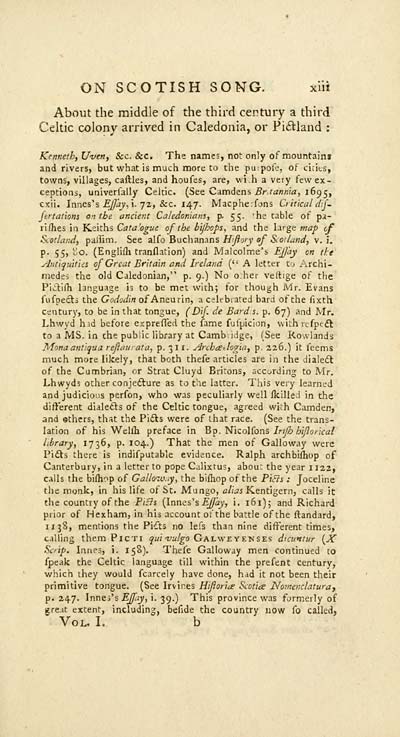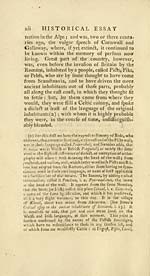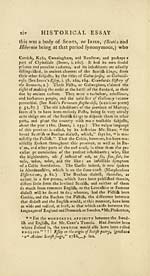Inglis Collection of printed music > Printed music > Scottish songs > Volume 1
(21) Page xiii
Download files
Complete book:
Individual page:
Thumbnail gallery: Grid view | List view

ON SCOTISH SONG. xiix
About the middle of the third century a third
Celtic colony arrived in Caledonia, or Piftland :
Kenneth, Uvtn, Sec. &C. The names, not only of mountains
and rivers, but what is much more to the puipofe, of cities,
towns, villages, caftles, and houfes, are, wi.h a very few ex-
ceptions, univerfally Celtic. (See Camdens Br.tannia, 1695,
cxii. Innes's Ejj'ay, i. 72, &c. 147. Macphefons Critical dj-
ftrtations on the ancient Caledonians, p. 55. 'he table of pa-
ri (hes in Keiths Cata'ogue of the bijhops, and the large map of
Scotland, palfim. See alfo Buchanans Hjivry of Scotland, v. i.
p. 55, 'Jo. (Englifh translation) and Malcolme's Ejj'ay on tht
Antiquities of Great Britain and Ireland ( <: A letter Vj Archi-
medes the old Caledonian," p. 9.) No o.her verhge of the
Pictilh language is to be met with; for though Mr. Evans
fufpects the Gododin of Aneurin, a celebrated bard of the lixth
century, to be in that tongue, ( Dif. de Bard s. p. 67) and Mr.
Lhwyd hrd before expreffed the fame fufpicion, with icfprcT:
to a MS. in che public library at Cambridge, (See Rowlands
Monaantlqua rejlaurata, p. 311. Archadogia, p. 226.) it feems
much more likely, that both thefe articles are in the dialect
of the Cumbrian, or Strat Cluyd Britons, according to Mr.
Lhwyds other conjecture as to the latter. This very learned
and judicious perfon, who was peculiarly well IkilleJ in the
different dialects of the Celtic tongue, agreed with Camden,
and ethers, that the Pidts were of that race. (See the trans-
lation of his Welfh preface in Bp. Nicolfons Info bifloncal
library, 1 736, p. 104.) That the men of Galloway were
Pi£ts there is indifputable evidence. Ralph archbiihop of
Canterbury, in a letter to pope Calixtus, about the year 1 122,
calls the biftiop of Galloio.y, the bilhop of the PiSis : Joceline
the monk, in his life of St. Mungo, alias Kentigern, calls it
the country of the PiEls (Innes's Ejj'ay, i. 161); and Richard
prior of Hexham, in his account of the battle of the ftandard,
1 1 38, mentions the Picts no lefs than nine different times,
Calling them Picti qui -vulgo Galweyenses dicuttur (X
Scip. lanes, i. 158). Thefe Galloway men continued to
fpeak the Celtic language till within the prefent century,
which they would fcarcely have done, had it not been their
primitive tongue. (See Irvines Hijloria? Scotia Nomenclatura,
p. 247. Innes's Effay, i. 39.) This province was formerly of
gre.it extent, including, befide the country now fo called.
Vol. I. b
About the middle of the third century a third
Celtic colony arrived in Caledonia, or Piftland :
Kenneth, Uvtn, Sec. &C. The names, not only of mountains
and rivers, but what is much more to the puipofe, of cities,
towns, villages, caftles, and houfes, are, wi.h a very few ex-
ceptions, univerfally Celtic. (See Camdens Br.tannia, 1695,
cxii. Innes's Ejj'ay, i. 72, &c. 147. Macphefons Critical dj-
ftrtations on the ancient Caledonians, p. 55. 'he table of pa-
ri (hes in Keiths Cata'ogue of the bijhops, and the large map of
Scotland, palfim. See alfo Buchanans Hjivry of Scotland, v. i.
p. 55, 'Jo. (Englifh translation) and Malcolme's Ejj'ay on tht
Antiquities of Great Britain and Ireland ( <: A letter Vj Archi-
medes the old Caledonian," p. 9.) No o.her verhge of the
Pictilh language is to be met with; for though Mr. Evans
fufpects the Gododin of Aneurin, a celebrated bard of the lixth
century, to be in that tongue, ( Dif. de Bard s. p. 67) and Mr.
Lhwyd hrd before expreffed the fame fufpicion, with icfprcT:
to a MS. in che public library at Cambridge, (See Rowlands
Monaantlqua rejlaurata, p. 311. Archadogia, p. 226.) it feems
much more likely, that both thefe articles are in the dialect
of the Cumbrian, or Strat Cluyd Britons, according to Mr.
Lhwyds other conjecture as to the latter. This very learned
and judicious perfon, who was peculiarly well IkilleJ in the
different dialects of the Celtic tongue, agreed with Camden,
and ethers, that the Pidts were of that race. (See the trans-
lation of his Welfh preface in Bp. Nicolfons Info bifloncal
library, 1 736, p. 104.) That the men of Galloway were
Pi£ts there is indifputable evidence. Ralph archbiihop of
Canterbury, in a letter to pope Calixtus, about the year 1 122,
calls the biftiop of Galloio.y, the bilhop of the PiSis : Joceline
the monk, in his life of St. Mungo, alias Kentigern, calls it
the country of the PiEls (Innes's Ejj'ay, i. 161); and Richard
prior of Hexham, in his account of the battle of the ftandard,
1 1 38, mentions the Picts no lefs than nine different times,
Calling them Picti qui -vulgo Galweyenses dicuttur (X
Scip. lanes, i. 158). Thefe Galloway men continued to
fpeak the Celtic language till within the prefent century,
which they would fcarcely have done, had it not been their
primitive tongue. (See Irvines Hijloria? Scotia Nomenclatura,
p. 247. Innes's Effay, i. 39.) This province was formerly of
gre.it extent, including, befide the country now fo called.
Vol. I. b
Set display mode to: Large image | Transcription
Images and transcriptions on this page, including medium image downloads, may be used under the Creative Commons Attribution 4.0 International Licence unless otherwise stated. ![]()
| Special collections of printed music > Inglis Collection of printed music > Printed music > Scottish songs > Volume 1 > (21) Page xiii |
|---|
| Permanent URL | https://digital.nls.uk/94587372 |
|---|
| Shelfmark | Ing.62 |
|---|---|
| Additional NLS resources: | |
| Attribution and copyright: |
|
| Description | In two volumes. |
|---|---|
| Shelfmark | Ing.62-63 |
| Description | Scottish and English songs, military music and keyboard music of the 18th and 19th centuries. These items are from the collection of Alexander Wood Inglis of Glencorse (1854 to 1929). Also includes a few manuscripts, some treatises and other books on the subject. |
|---|
| Description | The Glen Collection and the Inglis Collection represent mainly 18th and 19th century Scottish music, including Scottish songs. The collections of Berlioz and Verdi collected by bibliographer Cecil Hopkinson contain contemporary and later editions of the works of the two composers Berlioz and Verdi. |
|---|

